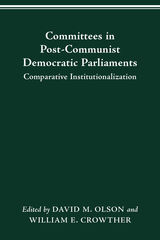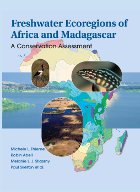
The former Communist countries of Eastern Europe provide a treasure-trove of data on the development of democratic institutions. The contributors to this volume use the recent experiences of these countries to identify how the various committee systems are structured and tie the relative strength of the committee system in each country to the relative strength of its legislature. A uniform theoretical framework connects the work of each essay and ties the parts into an informative whole.
Comparative analysis based on seven indicators of institutionalization suggests that the committee systems of Hungary, Poland, and the Czech Republic are more institutionalized than those found elsewhere. Bulgaria is a middle case, while the parliaments of Moldova, Lithuania, and Estonia are the least. Of the indicators, stability in committee membership and extent of committee activity are among the most important for post-communist parliaments in their first decade.
This examination of legislative committees in their beginning stages suggests that the processes of institutionalization are sequenced: expertise in a policy sector is the basis of both the assertion of jurisdictional autonomy by committees and the motive for party control of their membership and officer positions. Basic to these developments, however, is the emergence of a stable and consistent structure of the committee system as a whole. More broadly, committee attributes are closely linked to the condition and functioning of both parliamentary party groups and the government.

As part of a global effort to identify those areas where conservation measures are needed most urgently, World Wildlife Fund has assembled teams of scientists to conduct ecological assessments of all seven continents. Freshwater Ecoregions of Africa and Madagascar is the latest contribution, presenting in a single volume the first in-depth analysis of the state of freshwater biodiversity across Africa, Madagascar, and the islands of the region. Looking at biodiversity and threats in terms of biological units rather than political units, the book offers a comprehensive examination of the entire range of aquatic systems.
In addition to its six main chapters, the book includes nineteen essays by regional experts that provide more depth on key issues, as well as six detailed appendixes that present summary data used in the analyses, specific analytical methodologies, and a thorough text description for each of Africa's ninety-three freshwater ecoregions.
Freshwater Ecoregions of Africa and Madagascar provides a blueprint for conservation action and represents an unparalleled guide for investments and activities of conservation agencies and donor organizations.
READERS
Browse our collection.
PUBLISHERS
See BiblioVault's publisher services.
STUDENT SERVICES
Files for college accessibility offices.
UChicago Accessibility Resources
home | accessibility | search | about | contact us
BiblioVault ® 2001 - 2024
The University of Chicago Press









